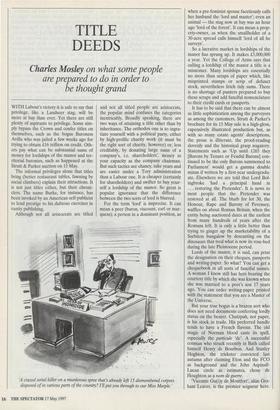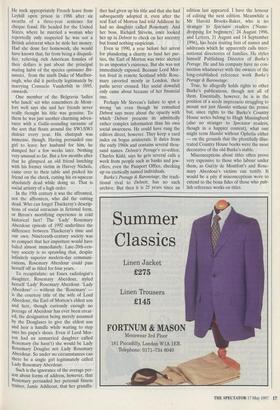TITLE DEEDS
Charles Mosley on what some people
are prepared to do in order to be thought grand
WITH Labour's victory it is safe to say that privilege, like a Landseer stag, will be more at bay than ever. Yet there are still plenty of aspirants to privilege. Some sim- ply bypass the Crown and confer titles on themselves, such as the bogus Baroness Avilla who was jailed a few weeks ago for trying to obtain £16 trillion on credit. Oth- ers pay what can be substantial sums of money for lordships of the manor and ter- ritorial baronies, such as happened at the Strutt & Parker auction on 15 May.
The informal privileges alone that titles bring (better restaurant tables, fawning by social climbers) explain their attractions. It is not just titles either, but their chroni- clers. The name Burke, for instance, has been invoked by an American self-publicist to lend prestige to his dubious exercises in vanity publishing.
Although not all aristocrats are titled and not all titled people are aristocrats, the popular mind confuses the categories inextricably. Broadly speaking, there are two ways of attaining a title other than by inheritance. The orthodox one is to ingra- tiate yourself with a political party, either by high-profile charity work (it must be the right sort of charity, however) or, less creditably, by donating large sums of a company's, i.e. shareholders', money in your capacity as the company chairman. But such tactics are chancy, take years and are easier under a Tory administration than a Labour one. It is cheaper (certainly for shareholders) and swifter to buy your- self a lordship of the manor. So great is popular ignorance that the difference between the two sorts of lord is blurred.
For the term 'lord' is imprecise. It can mean a peer (baron, viscount, earl or mar- quess); a person in a dominant position, as A crazed serial killer on a murderous spree that's already left 15 dismembered corpses disposed of in various parts of the country? I'll put you through to our Miss Marple.' when a pre-feminist spouse facetiously calls her husband the 'lord and master'; even an animal — the stag now at bay was an hour ago 'lord of the forest'. It can mean a prop- erty-owner, as when the smallholder of a 30-acre spread calls himself 'lord of all he surveys'.
So a lucrative market in lordships of the manor has sprung up. It makes £3,000,000 a year. Yet the College of Arms says that calling a lordship of the manor a title is a misnomer. Many lordships are essentially no more than scraps of paper which, like misprinted stamps or scrip of defunct stock, nevertheless fetch tidy sums. There is no shortage of punters prepared to buy these scraps and add fanciful nomenclature to their credit cards or passports.
It has to be said that there can be almost as little sophistication among the purveyors as among the customers. Strutt & Parker's brochure for its 15 May sale is a high-gloss, expensively illustrated production but, as with so many estate agents' descriptions, the prose is illiterate, the proof-reading slovenly and the historical grasp nugatory. Statements such as 'Up until 1265 they [Barons by Tenure or Feudal Barons] con- tinued to be the only Barons summoned to Parliament' would get a gamma double minus if written by a first-year undergradu- ate. Elsewhere we are told that Lord Bol- ingbroke 'had a principal hand in . . . restoring the Pretender'. It is news to most people that the Pretender was restored at all. The blurb for lot 30, the Honour, Rape and Barony of Pevensey, waffles on about Roman Britain, when the entity being auctioned dates at the earliest from many hundreds of years after the Romans left. It is only a little better than trying to ginger up the marketability of a Surbiton bungalow by descanting on the dinosaurs that trod what is now its rose-bed during the late Pleistocene period.
Lords of the manor, it is said, can print the designation on their cheques, passports and writing-paper. So what? You can get a chequebook in all sorts of fanciful names. A woman I know still has hers bearing the courtesy title by which she was known when she was married to a peer's son 17 years ago. You can order writing-paper printed with the statement that you are a Master of the Universe.
But your true bogus is a brazen sort who does not need documents conferring lordly status on the bearer. Chutzpah, not paper, is his stock in trade. His preferred handle tends to have a French flavour. The old magic of Norman blood casts its spell, especially the particule 'de'. A successful conman who struck recently in Bath called himself Henry de Bourbon. And Stanley Hoghton, the trickster convicted last autumn after claiming Eton and the FCO as background and the John Aspinall- Lucan circle as intimates, chose de Houghton as a nom de guerre.
`Vicomte Gu(i)y de Montfort', alias Gra- ham Leaver, is the premier seigneur here. He took appropriately French leave from Leyhill open prison in 1988 after six months of a three-year sentence for cheque fraud. He headed for the United States, where he married a woman who reportedly only suspected he was not a British aristocrat when he stole her money. Had she done her homework, she would have known that, far from being a disquali- fier, relieving rich American females of their dollars is just about the principal mating habit of the species optimates Bri- tannici, from the ninth Duke of Marlbor- ough, who did it perfectly legitimately by marrying Consuelo Vanderbilt in 1895, onwards.
One member of the Belgravia 'ladies who lunch' set who remembers de Mont- fort well says she and her friends never really thought his title was genuine. To them he was just another charming adven- turer with a Gallic-sounding surname of the sort that floats around the SW1/SW3 district every year. His chutzpah was immense, though. Having persuaded one girl to leave her husband for him, he dumped her a few weeks later. Nothing very unusual so far. But a few months after that he glimpsed an old friend lunching with his former victim in Harvey Nichols, came over to their table and pecked his friend on the cheek, cutting his ex-squeeze absolutely dead while doing so. That is social artistry of a high order.
In the 19th century it was the affronted, not the affronters, who did the cutting dead. Who can forget Thackeray's descrip- tions of social ostracism in fictional form, or Byron's mortifying experience in cold historical fact? The 'Lady' Rosemary Aberdour episode of 1992 underlines the difference between Thackeray's time and our own. Nineteenth-century society was so compact that her imposture would have failed almost immediately. Late-20th-cen- tury society is so sprawling that, despite infinitely superior modern-day communi- cations, Rosemary Aberdour could pass herself off as titled for four years.
To recapitulate: an Essex radiologist's daughter, Rosemary Aberdour, styled herself 'Lady' Rosemary Aberdour. 'Lady Aberdour' — without the 'Rosemary' is the courtesy title of the wife of Lord Aberdour, the Earl of Morton's eldest son and heir, though curiously enough no Peerage of Aberdour has ever been creat- ed, the designation being merely assumed by the Douglases to give the eldest son and heir a handle while waiting to step into his papa's shoes. Even if Lord Mor- ton had an unmarried daughter called Rosemary (he hasn't) she would be Lady Rosemary Douglas not Lady Rosemary Aberdour. So under no circumstances can there be a single girl legitimately called Lady Rosemary Aberdour.
Such is the ignorance of the average per- son about forms of address, however, that Rosemary persuaded her personal fitness trainer, Jamie Addicoat, that her grandfa- ther had given up his title and that she had subsequently adopted it, even after the real Earl of Morton had told Addicoat he had no daughter called Rosemary. And her boss, Richard Stevens, once looked her up in Debrett to check on her ancestry but found nothing suspicious.
Even in 1990, a year before her arrest for plundering a charity to fund her par- ties, the Earl of Morton was twice alerted to an impostor's existence. But she was not immediately exposed. Because Lord Mor- ton lived in remote Scotland while Rose- mary cavorted mostly in London, their paths never crossed. Her social downfall only came about because of her financial one.
Perhaps Mr Stevens's failure to spot a wrong 'un even though he consulted Debrett says more about the opacity with which Debrett presents its admittedly rather complex information than his own social awareness. He could have rung the editors direct, however. They keep a card index on bogus aristocrats. It dates from the early 1960s and contains several thou- sand names. Debrett's Peerage's co-editor, Charles Kidd, says he gets several calls a week from people such as banks and jew- ellers, even the Passport Office, checking up on exotically named individuals. Burke's Peerage & Baronetage, the tradi- tional rival to Debrett, has no such archive. But then it is 25 years since an edition last appeared. I have the honour of editing the next edition. Meanwhile a Mr Harold Brooks-Baker, who is no stranger to Spectator readers (Name- dropping for beginners', 24 August 1996, and Letters, 31 August and 14 September 1996), has been touting lists of names and addresses which he apparently calls inter- national directories of families. He styles himself Publishing Director of Burke's Peerage. He and his company have no con- nection whatsoever with the owners of the long-established reference work Burke's Peerage & Baronetage.
True, he allegedly holds rights to other Burke's publications, though not all of them. Essentially, however, he is in the position of a seedy impresario struggling to mount not just Hamlet without the prince but, since rights to the Burke's Country House series belong to Hugh Massingberd (also no stranger to Spectator readers, though in a happier context), what one might term Hamlet without Ophelia either — on the grounds that the plentifully illus- trated Country House books were the most decorative of the old Burke's stable.
Misconceptions about titles often prove very expensive to those who labour under them, as Gu(i)y de Montfort's and Rose- mary Aberdour's victims can testify. It would be a pity if misconceptions were to extend to the bona fides of those who pub- lish reference works on titles.



































































 Previous page
Previous page